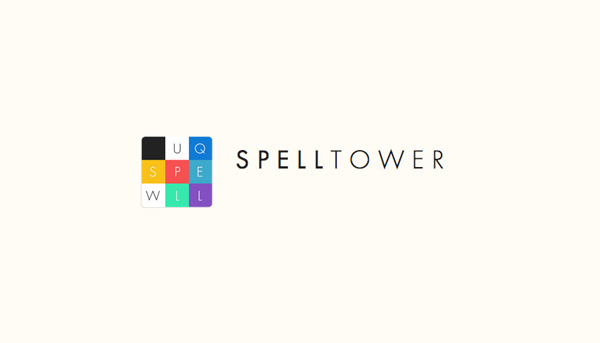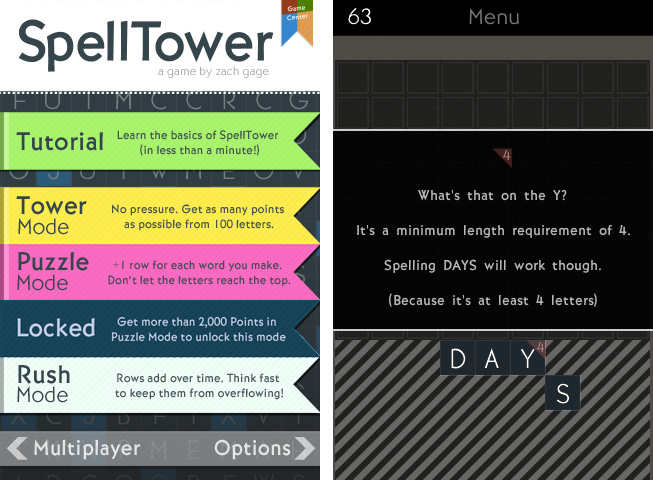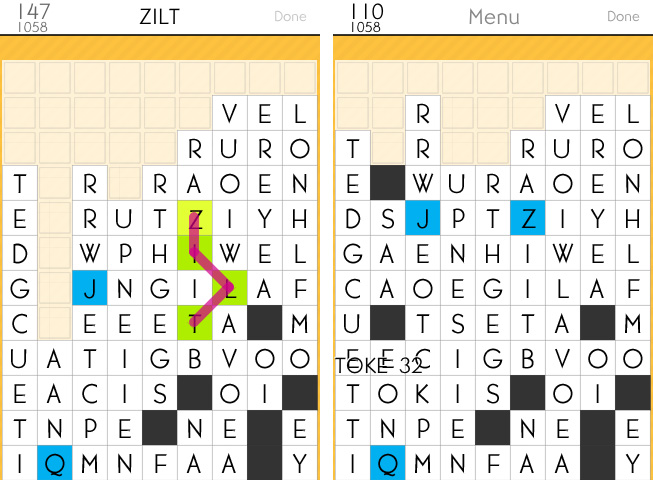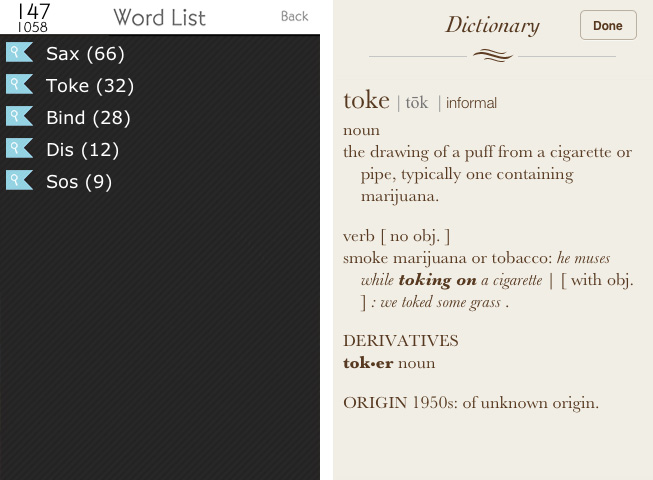I still remember the day when Chris recommended this game to me – SpellTower. When I looked at the game’s website for the first time, I asked myself whether it could be a new subject for my Inspiring UI series. Although I concluded that it would not fit the series, the website nevertheless looked like the game could be worth my time. Zach Gage, the developer, promotes SpellTower with a nice scrollable site, containing some lovely designed icons and symbols, large, mono-colored backgrounds, and some moving CSS3 flavour. It is a lovely website you should take a look at – whether you’re interested in games or not – just for the sake of admiring Zach’s work as a web designer.
But since I am interested in iOS games and I was curious to see if the game could live up to the site’s promise, I downloaded SpellTower for the ludicrously low price of $1.99 (actually, it’s currently on sale for $0.99, so please head over to the App Store to get it first, then continue reading afterwards). Allow me now to shortly recap what playing SpellTower is all about (the app features a one-minute tutorial, which also interactively explains the game’s concept). To summarize it in one sentence: to me, SpellTower is like Tetris with words.
Random blocks with letters arranged in twelve rows cover the screen, and you have to connect letters located abreast of each other. Some letters need to be included into certain minimum lengths, indicated by a small number in the top right of their square block, and words touching black boxes without letters will delete them. Blue colored letters included in a word (these are letters which are hard to incorporate into words, like “Z” or “J”) delete a whole row and generate a lot of points. Apart from those special features, the game follows one simple rule: the more letters a word has, and the more rare those letters are (a “Q” is obviously more valuable than an “E”), the more points you earn. That’s all there is to say about the game’s concept: you can start playing SpellTower within seconds, a prior condition a game needs to get you addicted to it.
This principle is translated into five different game modes, two of which you can unlock by reaching extraordinary results in the two basic ones: tower mode, where the screen is completely filled up with letters and the goal is to make as many points with them as possible; and the more tactical puzzle mode, which starts off with five rows, adding one row for each word you spell until the letters reach the top and the game ends. You can also play rush mode, which is the closest match to the idea of Tetris: rows add over time (whether you spell words or not), and you need to quickly eliminate them to prevent a letter from reaching the top. While I’m not the best at puzzle and rush mode — I do not even reach the 1000 points mark, and to unlock the fifth mode you need more than 2000 points — playing the tower mode always is a lot of unconstrained fun and makes me coming back again and again.
So, how exactly is this addiction accomplished? I think it’s a combination of three factors that Zach managed to mix perfectly: UI design, highscore competition, and a vocabulary learning process.
SpellTower isn’t primarily an example of innovative, unique UI design. There’s nothing exceptional that wows you when using it. The graphics are just there, and the game is designed two-dimensionally with simple colorization when selecting words to indicate possible combinations, and plain, sans-serif typography. But it is this particular unobtrusiveness – this more or less complete transparency of the UI – that enables a distraction-free view on the content. It’s plain, black and white — or in the case of night colors blue and white, which is the only little visual bauble Gage allowed in the game to improve legibility at lower light conditions — and it makes the content easy to scan, although the letters are pretty small. The user’s eye can comfortably focus on letters and possible words, and when it comes to working with typographic characters, it’s crucial to do this with as much whitespace and clean, non-distracting UI elements as possible. Otherwise, especially when talking about digital typography, screens get cluttered very quickly.
SpellTower solves this need for clean visual order; users can just play the game without spending any thoughts on the UI or feeling uncomfortable with it.
Next up is the strive for better highscores as a reason to play SpellTower again and again. Just like Tetris, after having played the game for a while and having transcended the stage of trying out all the various possibilities of its gameplay, beating your own highscores becomes your main goal. This concept never gets boring; actually, the amount of possible SpellTower combinations is obviously even higher than the possible connections of Tetris blocks, thus making SpellTower even more extensive concerning the tactics of how to reach better highscores.
Additionally, Gage implemented Game Center highscores and a Bluetooth/WiFi multiplayer option called Debate mode. It’s also this narcissistic touch in our gaming behaviors that makes SpellTower addictive — you don’t just get the feel of being better, but, in a way, also more intelligent than others. Why? Well, you have to be quick in connecting letters, but you also need a good vocabulary knowledge to score points in SpellTower: the longer and fancier your words, the better you are.
Which brings me to the third, most important and perhaps crucial factor: SpellTower’s learning effect, which takes place to a certain extent in the user’s mind while playing it. The feature responsible for this is the dictionary, which Gage embedded into the results screen after finishing a game. I’m from Germany, and I obviously do not have the same amount of vocabulary knowledge a native speaker has, although I have been speaking English for more than seven years now. Especially during the last minutes playing a round in tower mode, I more or less guess words just by trying out spellable combinations, and many of the produced results are words I never heard in my entire life. But I’m a curious person when it comes to language, and the dictionary is the perfect way to satisfy my desire for learning and incorporating those words and their meanings into my knowledge. Tapping a word in the result list opens a lexicon-style view with information and definitions for each word. This attaches a kind of intellectual profoundness to the game: with the dictionary feature, SpellTower gives you a small boost in intelligence after each round.
SpellTower has got an enormously flexible game concept, which applies to the gaming behavior of many people, from “fun” to “highscore players”, as I call them. In SpellTower, I consider myself more a fun than a highscore player — of course I want to reach better highscores too, but the dictionary feature always fulfills me whether I got better or not, and I primarily play it for the sake of wasting some time to relax.
Together, these features, surrounded by an unobtrusive and functional UI, make up the reason why SpellTower caused my addiction. It’s the perfect companion to kill some time while at the same time justifying it with the (rather deceptive, but still existent) learning possibility. Surprisingly, SpellTower makes you feel like playing a game is not a complete waste of time.





